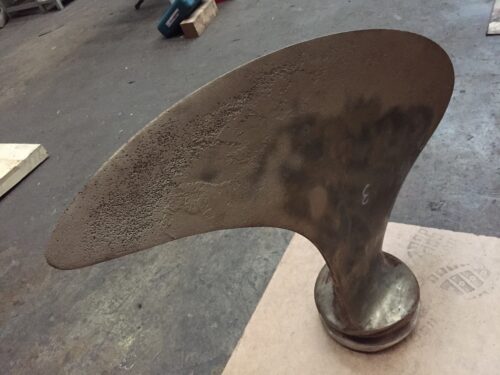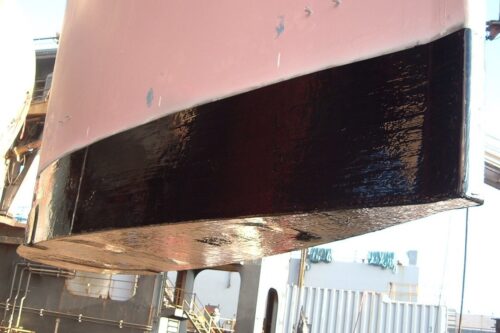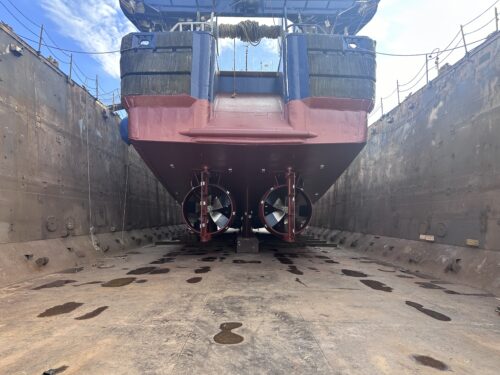Cavitation damage is one of the most common and destructive problems faced by boat owners and marine engineers. If left untreated, it can lead to severe cavitation erosion of critical components, reduced vessel performance, and costly repairs. In this blog, we’ll explain what cavitation damage is, why it happens, and how to effectively repair it using proven cold-applied cavitation solutions like those offered by Belzona.
What Is Cavitation Damage?
Cavitation damage occurs when vapor bubbles form and collapse rapidly in a liquid, typically around boat propellers, bow thrusters, rudders, and other submerged components. These bubbles implode with force, causing:
- Pitting
- Surface erosion, known as cavitation erosion
- Coating disbondment
- Loss of material thickness
This type of damage can severely weaken vital areas of a vessel, impacting both performance and safety.

Common Areas Affected by Cavitation on Boats
Propellers: Fast-spinning propellers often suffer from propeller cavitation damage, causing imbalance and vibrations.
Bow Thrusters: Complex flow patterns make these vulnerable to cavitation and require effective bow thruster protection.
Rudders and Nozzles: These directional control surfaces experience frequent cavitation erosion due to pressure changes.
Pump Impellers: High-speed fluid flow inside marine pumps can also trigger cavitation and damage.
Why Cavitation Damage Should Be Repaired Quickly
Ignoring cavitation damage can result in:
- Loss of structural integrity
- Increased drag and fuel consumption
- Propeller imbalance and vibrations
- Frequent maintenance and costly replacements
Timely cavitation erosion repair not only restores performance but also prevents damage from spreading to adjacent areas.

How to Repair Cavitation on Boats
Belzona offers proven, cold-applied marine coatings and anti-cavitation coatings specifically designed to combat cavitation and protect marine equipment from further damage. Here’s a step-by-step guide for effective marine equipment repair:
Step 1: Inspect and Assess the Damage
Thoroughly examine the affected areas to identify pitting, material loss, and coating failure. Document the extent of cavitation damage and prepare for surface preparation.
Step 2: Surface Preparation
- Remove loose materials, marine growth, and old coatings.
- Use abrasive blasting or mechanical tools to achieve a clean, roughened surface (usually a minimum of 3 mil (75 µm) profile).
Step 3: Rebuild Damaged Areas
- Use a suitable rebuilding product such as Belzona 1311 (Ceramic R-Metal) or similar to rebuild lost metal sections if required.
- This provides a solid base layer for further protection.
Step 4: Apply Epoxy-Based Coating
- Apply a suitable epoxy-based coating such as Belzona 1341 (Supermetalglide) or Belzona 5811 (Immersion Grade).
- This prevents cathodic disbondment, which may occur in extreme conditions.
Step 5: Apply Cavitation-Resistant Coating
- Protect the repaired area with Belzona 2141 (ACR-Fluid Elastomer), a flexible, high-performance anti-cavitation coating.
- This coating absorbs the energy from collapsing bubbles, preventing further erosion.
- Belzona’s cold-applied cavitation solution eliminates the need for hot work and allows for fast, safe application.
Step 6: Inspection and Return to Service
- Verify coating thickness and coverage.
- Allow the system to fully cure as per the manufacturer’s guidelines.
- Return the vessel or equipment to service with confidence.

Why Belzona Is the Smart Choice for Cavitation Repairs
Cavitation damage is a serious threat to marine vessels, but with proper inspection, preparation, and the right materials, it can be repaired quickly and effectively. Belzona’s cavitation-resistant marine coatings provide long-term protection, restoring vessel performance and reducing future maintenance needs.
FAQ
Cavitation damage occurs when vapor bubbles collapse near submerged surfaces, especially on high-speed vessels like fast ferries, catamarans, and pilot boats. These bubbles implode with force, causing cavitation erosion in critical areas like propellers, bow thrusters, and rudders.
When properly executed, cold-applied cavitation repairs using Belzona products can last several years, even in aggressive marine environments. For example, a fast ferry’s bow thruster coated with Belzona 2141 showed long-term durability, reducing maintenance cycles and repair costs.
Unlike traditional hot work or welding, Belzona repairs are cold-applied, minimizing downtime and eliminating the need for post-weld inspections. This makes Belzona ideal for time-sensitive marine repairs on vessels like supply ships and tugboats. Belzona materials also resist corrosion and future cavitation, offering a longer-term solution than basic metal patching.

Based in the Company’s Headquarters in Harrogate, Angus Jackson joined Belzona Ltd in 2024 as a Chemical Engineer. Specialising in repair composites and protective coatings, Angus works closely with Belzona’s authorised Distributor Network, providing technical support and training.
He plays a key role in helping select and apply advanced polymeric materials for asset protection, ensuring long-term performance and reliability. In addition to delivering product training, Angus is actively involved in troubleshooting and optimising solutions for corrosion, erosion, and mechanical damage in industrial systems.
Holding an MEng in Chemical Engineering from Newcastle University, Angus has a background in pipeline engineering and simulation, with expertise in hydraulic analysis for Oil & Gas, water, and wastewater systems. His experience in flow dynamics and system optimisation provides a strong technical foundation for his current work in materials engineering. Passionate about innovation and knowledge sharing, he is dedicated to enhancing infrastructure longevity through advanced engineering solutions.




Are there any objective customer reviews?I have 5811 on the hull of my steel houseboat and would like to know anyone else’s experience with it
It’s nice that you mentioned how a marine coating is an answer to the corrosion equipment and assets experience in the presence of fresh, salt, or brackish water. I was watching a documentary about the marine industry last night and I saw how they used commercial coating for one of the ships. I didn’t know that such a thing exists, but I could definitely understand why it is being used.